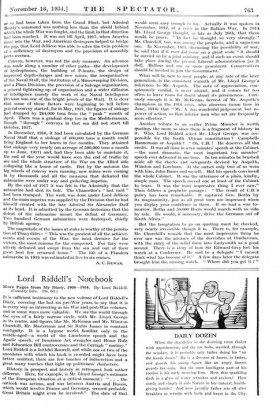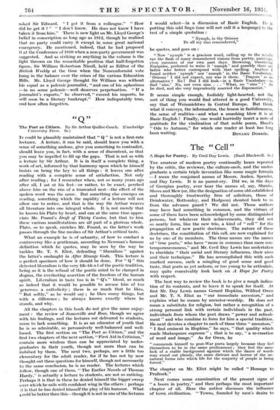Lord Riddell's Notebook More Pages from My Diary, 1908-1914. By
Lord RiddelL (Country Life. 10s. 6d.) IT is sufficient testimony to the new volume of Lord Riddeirs Diary, covering the last six pre-War years, to say that it is in every way as interesting as his War and post-War volumes, and in some ways more valuable. We see the world through the eyes of a fairly narrow circle, with Mr. Lloyd George as its centre, and figures like Mr. McKenna and Mr. Winston Churchill, Mr. Masterman and Sir Rufus Isaacs in constant contiguity. It is a bygone world, familiar only to the middle-aged—a world of the Limehouse speech and the Agadir speech, of Insurance Act struggles and Home Rule and Education Bill controversies and the Curragh " mutiny." Lord Riddell is a faithful Boswell, and while one or two of the anecdotes with which his book is crowded might have been better omitted, there are few touches of indiscretion and a great many touches that light up politicians' characters.
History in prospect and history in retrospect look rather different. Here, for example, is Mr. Lloyd George's estimate of the European situation at a critical moment : " . . . the outlook was serious, and war between Austria and Russia, which would involve France and Germany, seemed probable. Great Britain might even be involved." The date of that
would seem easy enough to fix. Actually it was spoken in November, 1912, at a crisis in the Balkan War. In 1914 Mr. Lloyd George thought, as late as July 26th, that there would be peace. " In fact he thought so very strongly." Mr. Churchill, too, was among the prophets, and a sagacious one. In November, 1911, discussing the possibility of war, he said that if it ever did come on a great scale " it should be carried on by a joint ministry, and if such an event should take place during the present Liberal administration [as it did, Balfour and one or more prominent Conservatives should be invited to join the Government."
What will be new to most people, at any rate of the later generation, is the consistent warmth of Mr. Lloyd George's references to Mr. Asquith. The note of appreciation, con- spicuously cordial, is never absent, and it comes far too often to leave room for doubt about its genuineness. Curi- ously enough it is Mr. McKenna, fiercest of Mr. Asquith's champions in the 1916 crisis, who observes (some time in June, 1914) that " Mr. A. has wonderful judgement but no power of action, so that inferior men who act are frequently more effective."
Another tribute to an earlier Prime Minister is worth quoting, the more so since there is a fragment of history in it. Who, Lord Riddell asked Mr. Lloyd George, was res- ponsible for the South African constitution ? Campbell- Bannerman or Asquith ? " Oh, C.B. I He deserves all the credit. It was all done in a ten minutes' speech at the Cabinet —the most dramatic, the most important ten minutes' speech ever delivered in our time. In ten minutes he brushed aside all the checks and safeguards devised by Asquith, Winston and Loreburn. At the outset only two of us were with him, John Burns and myself. But his speech convinced the whole Cabinet. It was the utterance of a plain, kindly, simple man. The speech moved one at least of the Cabinet to tears. -It was the most impressive thing I ever saw." Then follows a prophetic passage : " The result of C.B.'s policy has been remarkable. It captured Gen. Botha by its magnanimity, just as all great men are impressed when you display your confidence in them. If we had a war to- morrow, Botha and 50,000 Boers would march with us side by side. He would, if necessary, drive the Germans out of South Africa."
But the temptation to go on quoting must be checked, very nearly irresistible though it is. There is, for example, Mr. Churchill's remark that the most impressive thing he ever saw was the advance of the dervishes at Omdurman, with the entry of the relief force into Ladysmith as a good second. There is a story of how Sir Edward Grey lost his watch at a Conference. He said to a delegate " I cannot think what has become of it." A few days later the delegate brought him the missing watch. " Where did you get it ? " asked Sir Edward. " I got it from a colleague." " How did he get it ? " " I don't know. He does not know I have taken it from him." There is new light on !dr. Lloyd George's belief in conscription as long ago as 1912, though he realized that no party could carry it except in, some great national emergency. He mentioned, indeed, that he had proposed it at the Conference of 1910 when a non-party government was suggested. And as striking as anything in the volume is the light thrown on the remarkable position that half-forgotten figure, Sir William Robertson Nicoll, held as Editor of the British Weekly at the time when the Nonconformist vote hung in the balance over the crises of the various Education Bills. Mr. Lloyd George thought Sir William was without his equal as a polemic journalist, "and one of his aphorisms no sense polemic—well deserva perpetuation. " If a journalist's exports," he observed, " exceed his imports, he will soon be a literary bankrupt." How indisputably true, and how often forgotten.







































 Previous page
Previous page